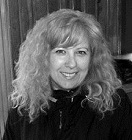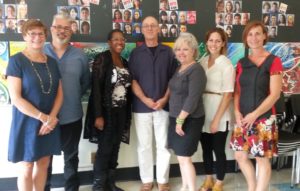 Executive Director, MASC
Executive Director, MASC
(Multicultural Arts for Schools and Communities)
MASC started 26 years ago as an Ottawa-based arts education organization, delivering arts education, workshops and arts residencies in school boards in Ottawa. Twenty-six years later, MASC represents a roster of over 68 professional artists who offer workshops, performances, artist-in-residence programs and professional development in music, dance, drama, literary, media and visual arts. MASC programs are delivered in English and French, throughout Eastern Ontario and Western Québec to students in Kindergarten to Grade 12, and to youths and adults in a variety of community settings (daycares, Youth Services Bureau of Ottawa, community centres, libraries, museums, festivals and seniors venues.)

MASC brings the arts and culture alive for over 120,000 children, youth, teachers and seniors each year. Working out of diverse cultural traditions, MASC is known widely as a dynamic and energetic team of artists and staff who are deeply invested in the communities they serve.
MASC is led by Audrey Churgin, Executive Director. I met with Audrey in Ottawa to talk about MASC and its commitment to arts education.
Audrey, how did you became involved with MASC?
As a professional artist who works collaboratively with children, my first interaction with MASC was when I was asked to consider joining the MASC visual arts program. Though I did not choose to follow up on the opportunity, I’m passionate about arts education for young people. Later, when I was offered the opportunity to take on a leadership role with MASC, I was able to leverage experience gained through my own art practice, but also as a teacher with decades of experience and as the Director of an artists’ advocacy group.
What communities does MASC serve?
As our organization has grown, our initial focus of arts education for children and youth in Ottawa schools has expanded into communities across Eastern Ontario. Our arts programs have evolved to include media arts and cross-disciplinary arts programs. In 2008, we began a seniors program and offered arts programs to immigrants and new Canadians. 40% of our artists come from diverse communities in all arts disciplines. Generally, all of our programs are offered in French and English.
Our reach extends north to Maniwaki, Quebec, west to Peterborough, east to Cornwall and across Eastern Ontario. We serve both urban and rural communities. Many of our schools are identified as serving ‘high need’ communities. MASC’s generous donors help us to bring accessible arts programming to those communities, as well as schools and communities who can afford to pay. Our programming is offered widely, to anyone – child, youth, senior, new Canadian.
How do you identify the need for a particular arts program ?
We maintain contacts within the school boards, who identify their priorities for arts education. The schools book arts programs directly with MASC, or may apply to MASC to access special funding to support that work. Artist programs can be adapted to the needs of a school or teacher. The artist often converses with teachers to develop a sense of their need and adapt a program they’ve built to meet that need. MASC has an extensive listing of arts programs in all disciplines and both languages. We encourage the schools and community organizations to invest in arts education. While MASC offers a subsidy, our experience tells us that shared costs with the school and community group deepens the commitment to ‘invest’ in arts education.
What is a priority in arts educations in the communities MASC serves ?
Our Board of Directors identified three priority areas for MASC – children and youth, seniors and a new focus on at risk youth. We started our seniors program with artists primarily delivering performances to seniors groups. This has evolved, quite successfully into more hands-on arts activity. Through the Awesome Arts program, we created cross-generational arts activity. An example would be – a senior learns storytelling and tells his or her story in a workshop, which is then presented in a school or community setting. Children and youth, in turn, learn and apply their media arts skills to animate the story.
What are key challenges today in arts education?
With funding from many sources becoming tight, it is more difficult to stay current with innovations in arts education. There are opportunities to attend professional conferences where national and international speakers assemble and innovative ideas are shared, but largely our budget can’t support our attendance. In the past it was possible, but not in recent years. I feel it is essential to MASC’s success to seek out new practices in the field, draw inspiration and collaborate with others.
What is next for MASC?
We are always trying to bring new and young talent into the organization, gaining access to new energy and creativity. We believe it is important to stay true to our core skills and abilities. A new initiative we are excited about is bringing arts education to youth in custody, where links are being established to enable a crossover of talent between them and other at-risk youth.
We partner with arts consultants in school boards to create Professional development opportunities for teachers, linking the arts to other curriculum areas such as literature and mathematics. NumerArtcy highlights the links between the arts and mathematical concepts. For example, in a mosaic workshop, the creation of a mosaic in the classroom intuitively involves measurement and patterns, connecting numeracy with a form of visual art. The artist is not the mathematical expert, but the arts workshop positions the teacher to find and highlight the artistic connections with mathematics.
Another MASC program delivered in partnership with school boards is IART (Indigenous Arts and Restorative Teachings). Workshops are delivered by Aboriginal artists in visual arts, dance and storytelling helping teachers to attain a deeper cultural understanding of first nations arts and culture, which they in turn will take back to the classroom.
Audrey and her team of Program Directors keep their finger on the pulse of the needs of children, youth and seniors in the arts. MASC successfully incorporates arts education into the education system and for youth and seniors in urban or rural communities across Eastern Ontario.
